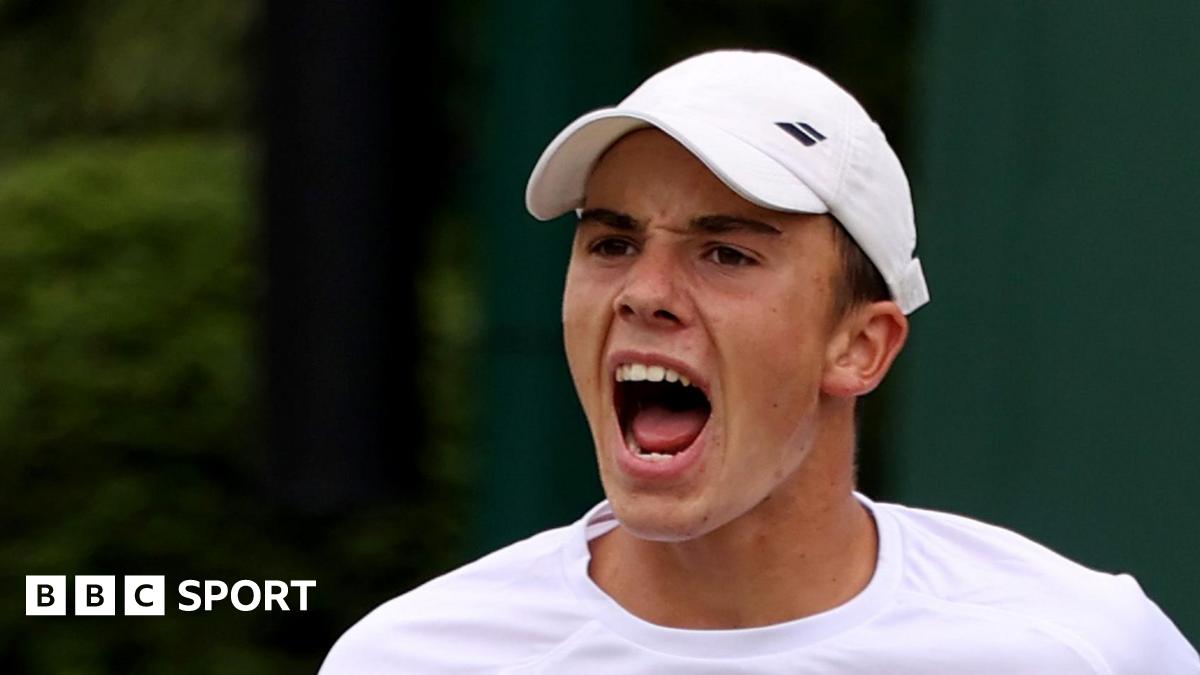Oliver Tarvet will make his Grand Slam main-draw debut after coming through Wimbledon qualifying British qualifier Oliver Tarvet has called for a change in United States college rules after being unable to claim all the prize money he will earn from reaching the Wimbledon main draw. Tarvet, 21, moved into the first round - where players receive £66,000 - after winning his third and final qualifying match on Thursday. The Englishman studies at the University of San Diego and has developed his game in the National Collegiate Athletic Association (NCAA) system. Under NCAA rules, players are restricted in how much they can claim from professional tournaments. On Friday, Tarvet explained players are allowed $10,000 (£7,290) in profit every year, as well as any expenses incurred during the events. "I know there have been complaints about it but I don't want to speak too much about it and overstep the mark," he said. "But in my opinion, I've worked hard to get this money. I don't feel like it's undeserved the money that I've got. "I think it would be good to see a change in the rules of the NCAA, but at the same time, I don't want to get involved. It's not really my place. "But I've done well this week. I think I deserve this money." Earlier this year, American college player Reese Brantmeierlaunched a class action,externalagainst the NCAA over the restrictions. Brantmeier, 20, was joined by Australian player Maya Joint - who forfeited more than $200,000 (£145,000) in US Open prize money after reaching the fourth round last year - as a co-plaintiff. Britain's Jay Clarke believes there is still a "barrier" stopping young black tennis players from developing in the UK. Last month, the LTA launched its 'equity, diversity and inclusion plan', saying it will "not be satisfied until the diversity of everyone involved in tennis reflects the diversity of the communities in the country". Clarke, 26, is among several British top-200 players with black or mixed heritage, including Heather Watson, Paul Jubb and George Loffhagen. "It is nice to see more black players breaking through and hopefully we can inspire more kids to pick up a racquet," said 26-year-old Clarke, who plays Dan Evans in the Wimbledon first round. "I think there is still a barrier and the sport is not amazingly accessible for black players. "The LTA have done good things to resurface park courts and give people opportunities. "The most important thing is seeing people like yourself playing and doing well on the big stages. Representation is important." This summer, Wimbledon is marking the 50th anniversary of Arthur Ashe's victory at the All England Club - the first black tennis player to win a Grand Slam men's singles title Ashe, who won three major titles, has been one of Clarke's biggest inspirations after being told the American player's story. "Having a black man win Wimbledon was amazing for my dad to see and that was passed on to me," Clarke added. "I watched highlights of him when I was younger and my dad used to get me to play differently - that's how I learned to play the sport."
'I deserve it' - GB qualifier wants prize money change
TruthLens AI Suggested Headline:
"Oliver Tarvet Advocates for NCAA Prize Money Rule Changes Following Wimbledon Qualification"
TruthLens AI Summary
Oliver Tarvet, a 21-year-old British tennis player, recently qualified for his first Grand Slam main draw at Wimbledon, where he will earn £66,000 for reaching the first round. However, Tarvet has expressed his frustration with the NCAA rules that limit how much college athletes can earn from professional tournaments. As a student at the University of San Diego, he is subject to the NCAA's restrictions, which allow players to keep only $10,000 in profit annually, along with any expenses incurred. Despite his success, Tarvet feels that he deserves to keep the entirety of his prize money, emphasizing the hard work he has put into achieving this milestone. He acknowledged that there have been complaints about the NCAA rules but refrained from delving too deeply into the topic, stating, "I think it would be good to see a change in the rules of the NCAA, but at the same time, I don’t want to get involved. It’s not really my place." This sentiment reflects a broader concern among college athletes regarding their financial rights in the competitive sports landscape.
In addition to Tarvet's situation, the article also highlights the ongoing conversation about diversity in tennis, particularly concerning young black players in the UK. Jay Clarke, a British player with mixed heritage, pointed out that there are still barriers that hinder the development of black athletes in the sport. The Lawn Tennis Association (LTA) has recently initiated an 'equity, diversity and inclusion plan' to address these issues and improve accessibility for underrepresented groups. Clarke, along with other successful players like Heather Watson and Paul Jubb, hopes to inspire future generations to engage with tennis. He cited the importance of representation, stating, "The most important thing is seeing people like yourself playing and doing well on the big stages." This summer also marks the 50th anniversary of Arthur Ashe's historic Wimbledon victory, serving as a powerful reminder of the impact of representation and the ongoing need for inclusivity in tennis.
TruthLens AI Analysis
You need to be a member to generate the AI analysis for this article.
Log In to Generate AnalysisNot a member yet? Register for free.
